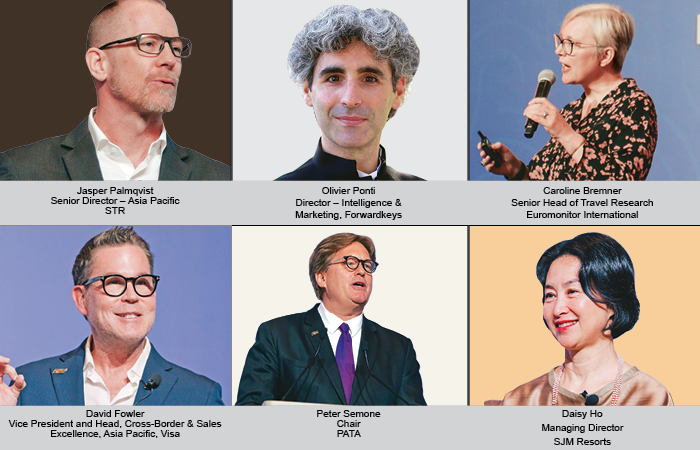The PATA Annual Summit, held recently in Macao on the theme ‘Reimagining Tourism’, witnessed interesting discussions on the future of Asian market. The summit highlighted the potential areas of growth in the region and trends that are likely to shape the industry in the coming years. Here is a brief summary of the key takeaways from this pivotal event.
TT Bureau
Jasper Palmqvist Senior Director – Asia Pacific STR Hotel performance in the last 12 months has surpassed historical levels, generating substantial revenue that offsets cost increases in areas such as labour and marketing. Consequently, hotels are rapidly becoming an attractive asset class for investors. Asia Pacific is trending towards dominant branded hotels.
Olivier Ponti Director – Intelligence & Marketing, Forwardkeys
In the APAC region, South Asia’s international arrivals have transitioned from recovery to growth, with 6 per cent rise in Q1 2024. Similarly, destinations in Central Asia, including Kazakhstan and Azerbaijan, have shown growth. Driving force behind this are intra-regional source markets like Vietnam and India.
Caroline Bremner, Senior Head of Travel Research
Euromonitor International Data reveals that 65 per cent of Asian consumers seek curated experiences, highlighting the importance of customisation. Additionally, eco-adventurer travellers are on the rise within the Asia-Pacific region. Furthermore, 23 per cent of APAC travellers prefer brands that prioritise people, planet, and profit.
David Fowler, Vice President and Head, Cross-Border & Sales Excellence, Asia Pacific, Visa
The travel industry is on its track to becoming a digital-first landscape driven by AI and technology, facilitating everything from booking and authentication to fraud detection and personalised travel offers. Integration with these technologies is essential for providing seamless, secure, and personalised travel experiences.
Peter Semone, Chair, PATA
The first step in reimagining tourism is to foster partnerships: Tie-ups between governments, businesses, NGOs, local communities, and other stakeholders is essential for effective tourism management. Partnerships can facilitate knowledge sharing, resource pooling, and coordinated action towards common goals.
Daisy Ho, Managing Director, SJM Resorts
Guided by 3Ps: People, Planet, and Prosperity, we provided over 410,000 hours of career development training, invested US $23 million on green procurements in the last year alone, and promoted a more even distribution of tourist flow and drove economic benefits to local SMEs.
Compiled by
 TravTalk India Online Magazine
TravTalk India Online Magazine





